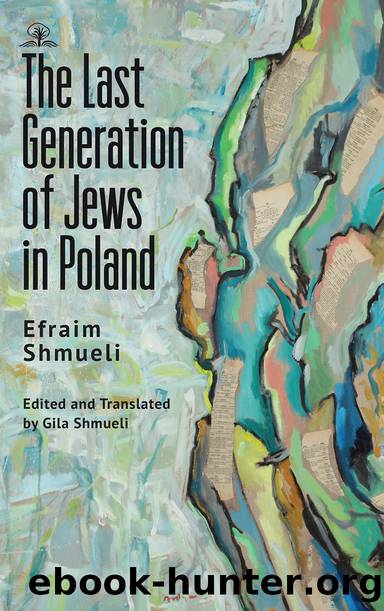The Last Generation of Jews in Poland by Efraim Shmueli

Author:Efraim Shmueli
Language: eng
Format: epub
Publisher: Academic Studies Press
Published: 2021-10-27T00:00:00+00:00
Poet Adam Mickiewicz â Polandâs great âBardâ
Exam material surely included the epic Pan Tadeusz by Adam Mickiewicz, a distinctly national tale, albeit about the szlachta (the nobility) in its period of decline, focused on small landowners, their exploits and chicanery. The poem describes Poland as reality and as visionâas it was at the end of the eighteenth century and under Napoleon, and as it never was. It expresses the mood of an exiled poetâin the sense of Haleviâs âMy heart in the East/ But the rest of me far in the Westâ30âas he experienced it in France, the center of Polish émigrés, after the failure of the 1831 rebellion against Russia. âI longed to pass by in my flight, bird of feeble wing, to pass by regions of storm and thunder, and to search out only pleasant shade and fair weatherâthe days of my childhood, and my home gardens.â31
The book is âPolishâ through and through, with its fanaticism, licentiousness, and disruption of public order, and at the same time, it is very human, compassionate, and full of radiant descriptions of sun-touched wheat fields and the moonâs enchantment for love and its yearnings. The book abounds in descriptions of persons and landscapes, soothing idyllic scenes and rattling scenes of hunting, battles, disputes and arguments, passions and yearnings for deliverance, heroic deeds and remorse, many rejoicings and great griefs. No wonder that Pan Tadeusz was a mandatory subject in every Polish school. Good taste has counselled the current regime32 to declare this poem âkosherâ even for Communism.
We Jewish readers who learned about the szlachta of that period were well acquainted with its harsh oppression of Jews. Ber Bolochower33 recounted in his memoirs how Polish noblemen abused âtheirâ Jews, how the poor wretches were forced to dance before them, singing âMajufes.â34 This is the period of the Council of Four Lands,35 and the Besht and his associates and disciples are busy with âredemption of captivesâ from Polish landowners. Only one year before our review of Bolochowerâs memoir, in 1927, the Jewish Polish historian Majer Balaban published the memoirs of the nobleman Jan Duklan Ochocki from the beginning of 1774, and they speak for themselves:
5 January. The lessee of the tavern still owes me 91 gold pieces for the past three months. I was authorized, according to the contract between us, to take severe measures and imprison him, his wife and children, until he pays his debt, but I ordered to seize only the swindler himself and to confine him in the pig sty, whereas his wife and children I allowed for the time being to remain in the tavern. Only his youngest son, Leizer, I took to my court and ordered to have him taught the Lordâs Prayer and the catechism, since he is a bright boy. I would like to have him baptized and have already talked this over with the priest who promised to come to court in order to prepare the young soul for baptism. At first, Leizer refused to
Download
This site does not store any files on its server. We only index and link to content provided by other sites. Please contact the content providers to delete copyright contents if any and email us, we'll remove relevant links or contents immediately.
Room 212 by Kate Stewart(5119)
The Crown by Robert Lacey(4814)
Endurance: Shackleton's Incredible Voyage by Alfred Lansing(4780)
The Iron Duke by The Iron Duke(4354)
The Rape of Nanking by Iris Chang(4211)
Joan of Arc by Mary Gordon(4109)
Killing England by Bill O'Reilly(4001)
Say Nothing by Patrick Radden Keefe(3984)
I'll Give You the Sun by Jandy Nelson(3447)
Shadow of Night by Deborah Harkness(3367)
Hitler's Monsters by Eric Kurlander(3342)
Mary, Queen of Scots, and the Murder of Lord Darnley by Alison Weir(3210)
Blood and Sand by Alex Von Tunzelmann(3203)
Eleanor & Park by Rainbow Rowell(3172)
Darkest Hour by Anthony McCarten(3129)
Margaret Thatcher: The Autobiography by Thatcher Margaret(3082)
Book of Life by Deborah Harkness(2938)
Red Famine: Stalin's War on Ukraine by Anne Applebaum(2932)
The One Memory of Flora Banks by Emily Barr(2863)
